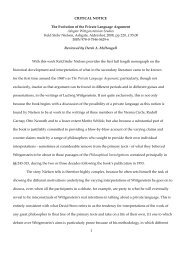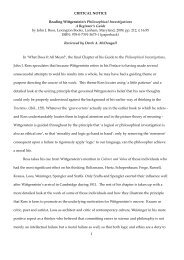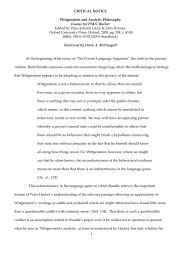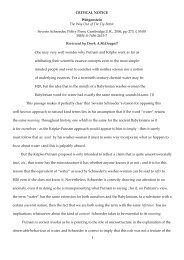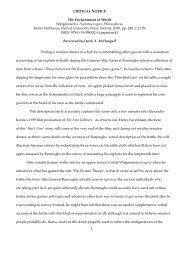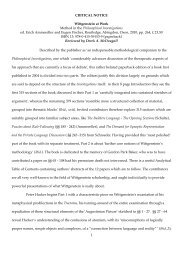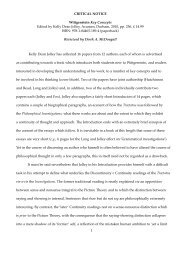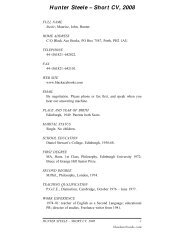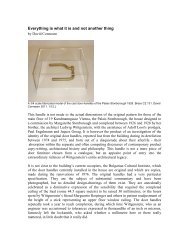Wittgenstein's Philosophical Investigations A Critical Guide
Wittgenstein's Philosophical Investigations A Critical Guide
Wittgenstein's Philosophical Investigations A Critical Guide
You also want an ePaper? Increase the reach of your titles
YUMPU automatically turns print PDFs into web optimized ePapers that Google loves.
later found to have been inapplicable to him.<br />
What Bridges would appear to be indirectly pointing towards here, although there is no<br />
indication that this is something with which he would agree, is that in the final analysis the items<br />
of information about its bearer which a person might very well mention, when asked to do so, in<br />
order to explain his use of the name of some historical person like Moses, are in one respect quite<br />
incidental to his understanding of the name in the contexts in which he uses it. Although this must<br />
seem paradoxical, it is consistent with what must surely be the wholly Wittgensteinian point that<br />
to actively participate in the practice of using a name correctly to talk about its bearer, a speaker<br />
need not in doing so have any of these items of information about him, or any associated images<br />
relating to him, actually in mind. The paradox arises solely because it would normally be taken to<br />
be incumbent upon anyone who claimed to know who Moses is, to be able to relate information of<br />
precisely this kind, even if this should be on a sliding scale from ‘the man mentioned in passing by<br />
Jones in our Biblical discussions’ onwards to a complete familiarity with the biography of Moses.<br />
Whilst indirectly ‘reminding’ us of facts of this particular kind, Wittgenstein nevertheless has no<br />
intention of providing a theory about proper names in which these facts may play any significant role.<br />
Bridges continues by discussing the notion of family resemblance, and here Travis is<br />
understood to be guilty of claiming that what we state to be so of an object, in called it a ‘game’,<br />
say, will vary from occasion to occasion; so that the varying features of different activities that are<br />
collectively called ‘games’ will themselves determine that different ‘understandings’ will surely<br />
accompany these different applications of the term. Bridges once again argues that Wittgenstein<br />
aims to establish that exactly the opposite is so, because what is being applied from case to case is<br />
the same concept. Bridges’ paper illustrates the tension, even conflict, that seems integral to the<br />
interpretation of Wittgenstein on these and similar matters. It results from a failure on the part of the<br />
reader, if not on the part of the commentator, to reconcile the temptation to enter into theoretical<br />
debate, with the methodological pronouncements with which we are all only too familiar.<br />
Richard Rorty begins his paper ‘Wittgenstein and the linguistic turn’ with the controversial<br />
22



